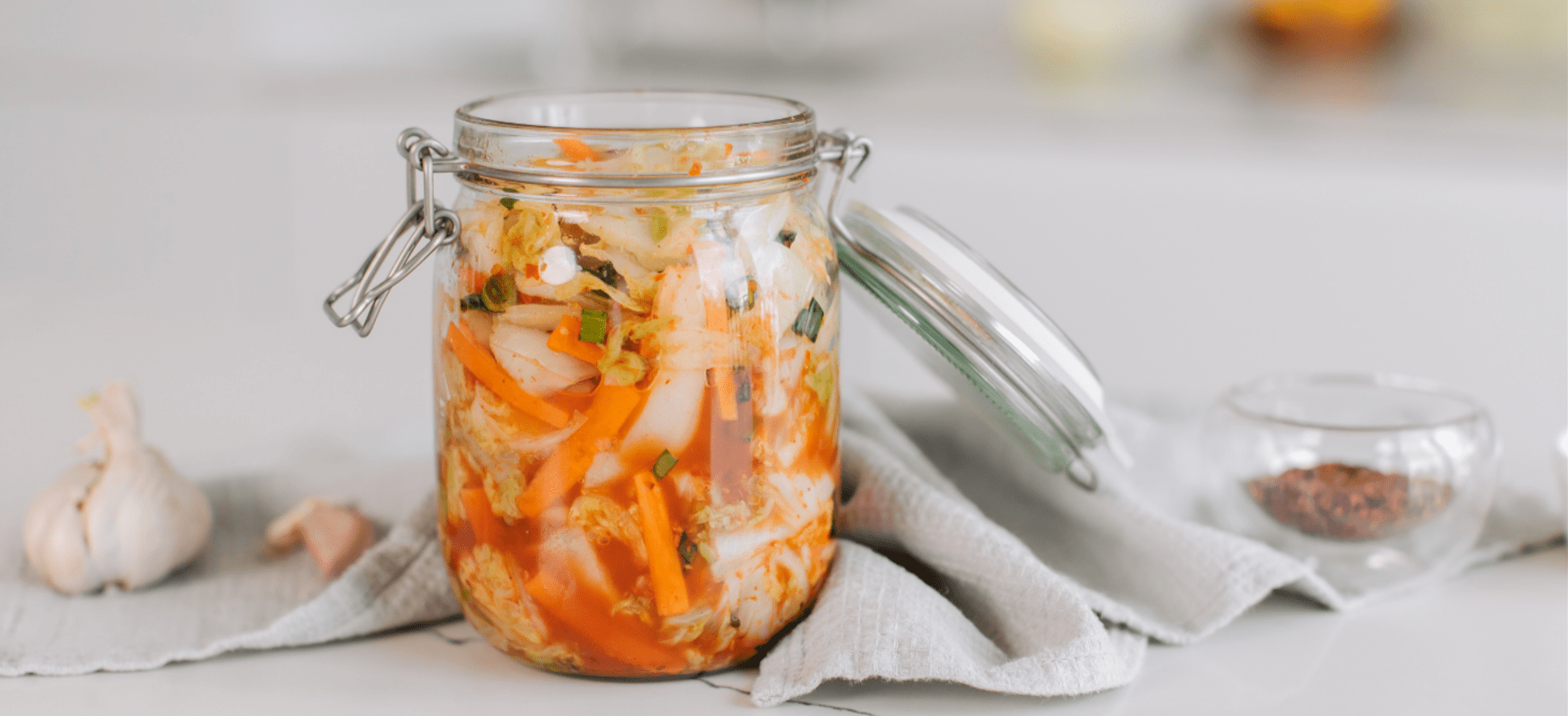Fermentation isn't merely a passing trend; it's a practice cherished by your gut bacteria as well! That's why we're excited to introduce you to kimchi – a true superfood. Keeping in line with our preference for straightforward cooking, our recipe offers a simplified take on the traditional version, and it's even vegan. Yet, rest assured, this doesn't compromise on taste or any of the health perks.
Kimchi could be likened to the Korean cousin of sauerkraut, translating to "pickled vegetables" in its simplest form. While there are numerous Kimchi recipes rooted in family traditions, they all share that signature tangy-spicy flavor profile and an indulgence for your gut microbiome.
So, what ist fermentation exactly?
Dating back ages ago, fermentation stands as one of the oldest techniques for food preservation. At its core, it involves a carefully controlled proliferation of microorganisms (1). While it might seem intimidating initially, fermentation packs a host of benefits.
The primary players in fermentation are lactic acid bacteria (LAB), or Lactobacilli, which naturally inhabit untreated vegetables and multiply during the fermentation process. Their role? Breaking down the carbohydrates present in vegetables, resulting in the production of vitamins, minerals, and antimicrobial compounds. This not only extends the shelf life of food but also amplifies ist flavors and renders it more digestible for us. Fermentation offers relief to our digestive system and bolsters the accessibility of vital nutrients. Moreover, we reap the rewards of consuming live bacteria, known as probiotics , which colonize our gut. Probiotic-rich foods foster the diversity of our gut microbiome, offering a myriad of health advantages (4).
How does Kimchi affect my health?
Research indicates that kimchi can play a pivotal role in preventing and alleviating various digestive issues, including hard stools , constipation, and diarrhea. This is primarily credited to its robust fiber content and probiotic properties (2, 3, 5). Furthermore, there's compelling evidence suggesting that kimchi may offer relief from symptoms associated with irritable bowel syndrome (IBS) (5).
Kimchi, along with other fermented foods, boasts a multitude of beneficial qualities, including anti-carcinogenic, cholesterol-lowering, anti-inflammatory, and blood sugar-regulating effects. Regular consumption of Kimchi can also bolster your immune system , promote skin health and aid in weight management (3, 5).
Despite Kimchi's elevated salt content, research has not uncovered adverse effects linked to high blood pressure (5).
What elevates kimchi to the status of a superfood?
The combination of nutritious ingredients and the fermentation method renders kimchi a powerhouse of essential micronutrients. It's packed with Vitamin C, ß-carotene, vitamins B, and an array of minerals including sodium, calcium, potassium, and iron. Moreover, the fermentation imbues the vegetables with abundant gut-friendly fibers and health-enhancing compounds such as capsaicin from chili flakes or gingerol from ginger (3).
The nutrient composition of kimchi can vary depending on the ingredients utilized in its preparation, and the quantity and strains of probiotic bacteria present may differ according to the recipe. Nonetheless, Lactobacilli spearhead the fermentation process (1), being renowned for fortifying the immune system and alleviating digestive issues.

Chinese cabbage is the main ingredient in kimchi.
Ingredients
- 1 Chinese cabbage (approximately 1 kg)
- 2 carrots
- 1 bunch of spring onions
- Natural salt*
for the paste:
- 4 cloves of garlic
- 1 onion
- 30 g fresh ginger
- 1 apple
- 2 tbsp naturally brewed soy sauce**
- 0.5-2 tbsp chili flakes or fresh chili (depending on desired spiciness)
- Jars with a total capacity of about 2 liters
Tip: You can use simple screw-top jars with metal lids or Weck jars. To ensure your preserving jars are free from germs, immerse them along with the lids in a large pot of water and sterilize them for 10 minutes in boiling water.
Preparation
-
Prepare the vegetables:
- Cut the Chinese cabbage into bite-sized pieces.
- Peel and slice or grate the carrots into sticks.
- Rinse the spring onions and cut them into rings.
- Combine the vegetables and weigh them together. You'll need 2% of the vegetable weight in salt. Simply multiply the weight shown on your scale by 0.02 to determine the required amount of salt. For instance, for 1000g of vegetables, you'll need 20g of salt.
- Massage the salt into the vegetables. Over time, this will release cell fluid, softening the Chinese cabbage and immersing it in the brine.
-
Prepare the kimchi paste:
- Peel the garlic cloves, onion, ginger, and apple.
- Place the peeled garlic cloves, onion, ginger, apple, soy sauce, chili, and a splash of water in a blender until a paste forms.
-
Mix and fill your jars:
- Using your hands, work the paste into the vegetables.
- Fill your jars with the kimchi mixture, pressing down on the vegetables layer by layer. Leave about 3 cm of space at the top of the jar to allow for gas production during fermentation.
- Ensure that all the vegetables are submerged in the brine to prevent spoilage and mold. If needed, add some saltwater.
-
Fermentation:
- Seal your jars tightly, as fermentation occurs anaerobically (without oxygen). You may notice small bubbles forming inside the jar, indicating bacterial activity.
- Allow the jars to sit at room temperature for 1-2 weeks, allowing the microbes to ferment undisturbed. The longer the fermentation period, the more intense the flavor will become.
- Once you're satisfied with the flavor intensity, transfer the kimchi to the refrigerator to stop the fermentation process.
Notes & Remarks
To avoid spoilage and mold formation, refrain from unnecessarily opening or stirring the kimchi. Optionally, fermentation weights can help keep the vegetables submerged in the liquid. If the vegetables rise above the liquid, gently press them down with a clean spoon before sealing the jar tightly.
*Salt: Opt for unrefined sea salt, Himalayan salt, or rock salt. Processed and iodized salt may interfere with the fermentation process.
**Soy Sauce: Ensure that you use naturally brewed soy sauce, which undergoes a months-long fermentation process involving only soybeans, grains (wheat or barley), and salt. Verify the authenticity of the ingredients by checking the label.

Salt inhibits the growth of unwanted microorganisms and facilitates the fermentation process for Lactobacilli.
Kimchi Tips
Creativity in the kitchen:
The realm of fermented cuisine offers boundless opportunities for culinary creativity! Try it out with different cabbage varieties, incorporating seasonal ingredients, or by repurposing leftovers from your fridge. Feel free to add your preferred spices or omit ingredients that don't quite suit your taste buds.
Traditional variations:
For a more authentic version, consider mixing 3 tbsp of rice flour with 160 ml of water to create a rice paste. Briefly cook it until thickened, then massage it into the vegetables. Another classic ingredient is fish sauce, adding a distinctive aromatic note to the kimchi.
Serving Suggestions:
In Korea, Kimchi is served daily alongside steamed rice. Enjoy kimchi straight from the jar as a side dish akin to a salad, or use it to elevate sandwiches.
Kimchi serves as a versatile ingredient in a myriad of delicious dishes such as kimchi fried rice (kimchi bokkeumbap) or kimchi pancakes (Kimchijeon). Keep in mind that heating the kimchi may lead to the loss of probiotic bacteria. Nevertheless, thanks to its abundance of fiber and micronutrients, kimchi remains a flavorful and healthy addition to your diet.
References
- Dimidi, E., Cox, S. R., Rossi, M., & Whelan, K. (2019). Fermented Foods: Definitions and Characteristics, Impact on the Gut Microbiota and Effects on Gastrointestinal Health and Disease. Nutrients, 11(8), 1806. https://doi.org/10.3390/nu11081806
- Kaiser, S. (2019). 20 Hausmittel gegen Verstopfung. Online unter: https://www.bio-apo.de/ratgeber/verdauung/hausmittel-gegen-verstopfung/
- Park, K.-Y., Jeong, J.-K., Lee, Y.-E., & Daily, J. W. (2014). Health Benefits of Kimchi (Korean Fermented Vegetables) as a Probiotic Food. Journal of Medicinal Food, 17(1), 6–20. https://doi.org/10.1089/jmf.2013.3083
- Şanlier, N., Gökcen, B. B., & Sezgin, A. C. (2019). Health benefits of fermented foods. Critical Reviews in Food Science and Nutrition, 59(3), 506–527. https://doi.org/10.1080/10408398.2017.1383355
- Song, E., Ang, L., Lee, H. W., Kim, M.-S., Kim, Y. J., Jang, D., & Lee, M. S. (2023). Effects of kimchi on human health: A scoping review of randomized controlled trials. Journal of Ethnic Foods, 10(1), 7. https://doi.org/10.1186/s42779-023-00173-8





